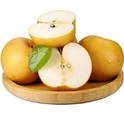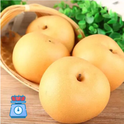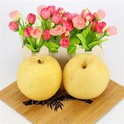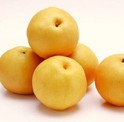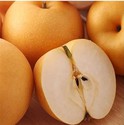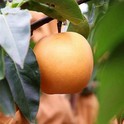What are the best pear varieties for a home orchard?
As a seasoned supplier of diverse pear varieties, I've witnessed the joy and satisfaction that a well - chosen pear tree can bring to a home orchard. Selecting the right pear varieties is crucial, as it not only affects the taste and quality of the fruit but also the overall success of your orchard. In this blog, I'll share some of the best pear varieties that are well - suited for home orchards.
Bartlett Pears
Bartlett pears are perhaps the most well - known pear variety in many Western countries. They are characterized by their smooth, thin skin that turns from green to yellow as they ripen. These pears have a classic, sweet, and juicy flavor with a buttery texture.
One of the great advantages of growing Bartlett pears in a home orchard is their adaptability. They can thrive in a wide range of soil types, as long as the soil is well - drained. Bartlett pear trees are also relatively easy to care for. They require full sun exposure, which means at least six hours of direct sunlight per day.
When it comes to pollination, Bartlett pears are self - sterile, which means they need another compatible pear variety nearby for cross - pollination. Good pollinators for Bartlett pears include Anjou and Bosc pears. The fruit usually ripens in late summer, making it a great addition to your home - grown fruit harvest during that time.
Anjou Pears
Anjou pears, both red and green varieties, are another excellent choice for a home orchard. Green Anjou pears have a crisp texture and a sweet, mild flavor. Red Anjou pears, on the other hand, have a slightly more intense flavor and a beautiful red blush on their skin.
These pears are known for their long storage life. If you store them in a cool, dark place, they can last for several months. Anjou pear trees are hardy and can tolerate colder temperatures better than some other varieties. They also have a relatively compact growth habit, which makes them suitable for smaller home orchards.
Anjou pears are also self - sterile, so they need a pollinator. Bartlett and Bosc pears can serve as good pollinators for Anjou pears. They typically ripen in the fall, a bit later than Bartlett pears, providing a continuous supply of fresh pears in your orchard.
Bosc Pears
Bosc pears are easily recognizable by their long, slender necks and brownish - russeted skin. They have a firm, crisp texture and a rich, sweet flavor with a hint of spice. Bosc pears are great for eating fresh, as well as for cooking and baking.
Bosc pear trees are moderately vigorous and can grow well in a variety of climates. They require well - drained soil and full sun. Similar to Bartlett and Anjou pears, Bosc pears are self - sterile and need a pollinator. Anjou and Bartlett pears can be used for cross - pollination.
The fruit of Bosc pears ripens in the fall. Their firm texture makes them ideal for poaching and making pear tarts, as they hold their shape well during cooking.
Lovely Sweet Pear
The Lovely Sweet Pear is a hidden gem among pear varieties. It lives up to its name with an incredibly sweet and aromatic flavor. The skin of this pear is smooth and has a beautiful golden - yellow color when ripe.
This variety is relatively disease - resistant, which is a huge plus for home orchard owners. It can adapt to different soil conditions, although it prefers slightly acidic, well - drained soil. The Lovely Sweet Pear tree has a moderate growth rate and can be easily pruned to maintain its shape.
It is also a self - sterile variety, so it needs a compatible pollinator. Some of the other pear varieties mentioned above, such as Bartlett or Anjou, can be used for cross - pollination. The fruit ripens in mid - summer, offering an early harvest of delicious pears.
Comice Pears
Comice pears are often considered the sweetest and juiciest of all pear varieties. They have a round, plump shape and a short neck. The skin is greenish - yellow with a red blush in some cases.
Comice pears are a bit more finicky than some other varieties. They require well - drained, fertile soil and full sun. They are also more sensitive to cold temperatures, so they are better suited for regions with milder winters.
Like other self - sterile pear varieties, Comice pears need a pollinator. Anjou and Bosc pears can be used for cross - pollination. The fruit ripens in the fall and is best eaten fresh to fully enjoy its rich, sweet flavor.
Asian Pear Varieties
Asian pears, also known as sand pears, are a unique addition to a home orchard. They have a crisp, apple - like texture and a sweet, refreshing flavor. There are many different Asian pear varieties, such as Hosui, Shinko, and 20th Century.
Asian pear trees are generally hardy and can tolerate a wide range of soil conditions. They are also relatively disease - resistant. Asian pears are self - sterile, so they need a compatible pollinator. Planting different Asian pear varieties together can ensure good cross - pollination.
The fruit of Asian pears ripens in late summer to early fall. They are great for eating fresh, and their firm texture makes them suitable for slicing and adding to salads.
Considerations for Home Orchard Owners
When choosing pear varieties for your home orchard, there are several factors to consider. Firstly, consider the climate in your area. Some pear varieties are more cold - hardy, while others prefer warmer climates. Make sure to choose varieties that are suitable for your local climate to ensure a successful harvest.


Secondly, think about the size of your orchard. If you have a small space, look for dwarf or semi - dwarf pear tree varieties. These trees take up less space and are easier to manage.
Pollination is another important factor. As most pear varieties are self - sterile, you need to plant at least two different compatible varieties for cross - pollination. Make sure to research which varieties are good pollinators for each other.
Finally, consider your personal taste preferences. Do you like sweet, juicy pears or crisp, tart ones? Choose the varieties that you and your family will enjoy eating.
Why Choose Our Pear Varieties?
As a supplier of high - quality pear varieties, we take pride in offering a wide selection of healthy and disease - resistant pear trees. Our trees are carefully nurtured from the start, ensuring that they are strong and ready to thrive in your home orchard.
We provide detailed information about each pear variety, including their growth habits, pollination requirements, and fruit characteristics. Our team of experts is also available to answer any questions you may have about growing and caring for your pear trees.
Whether you are a novice or an experienced orchardist, we can help you choose the best pear varieties for your specific needs. We offer competitive prices and reliable shipping services to ensure that your pear trees arrive at your doorstep in excellent condition.
Contact Us for Procurement
If you are interested in purchasing pear trees for your home orchard, we would love to hear from you. We can discuss your requirements, recommend the best pear varieties for your situation, and provide you with a quote. Contact us today to start your journey towards a bountiful pear harvest in your home orchard.
References
- "The Fruit Gardener's Bible" by Lewis Hill
- "Growing Fruit Trees in Your Backyard" by the University of California Cooperative Extension
- Various horticultural research papers on pear cultivation and varieties.

